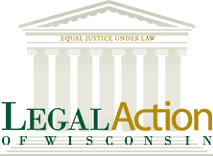 The legal problems faced by low-income people often threaten them with dire consequences: eviction, loss of income, domestic violence, loss of health care, homelessness, repossession of vehicles (which can result in the loss of employment) and more. These are the problems that Legal Action of Wisconsin (LAW) helps over 8,000 people address each year. While the cases usually do not involve large sums of money, the outcomes for poor families can be of enormous importance. LAW’s advocates provide legal assistance with a wide range of legal issues to help families maintain their homes, their income, and their personal safety.
The legal problems faced by low-income people often threaten them with dire consequences: eviction, loss of income, domestic violence, loss of health care, homelessness, repossession of vehicles (which can result in the loss of employment) and more. These are the problems that Legal Action of Wisconsin (LAW) helps over 8,000 people address each year. While the cases usually do not involve large sums of money, the outcomes for poor families can be of enormous importance. LAW’s advocates provide legal assistance with a wide range of legal issues to help families maintain their homes, their income, and their personal safety.
LAW serves a 39-county area of southern and central Wisconsin (Wisconsin’s northern 33 counties are served by Wisconsin Judicare), with offices located in Milwaukee, Racine, Madison, Oshkosh, Green Bay and LaCrosse. Its service area includes approximately 75 percent of Wisconsin’s poverty population. Some of its projects are statewide, such as the Migrant Project, which provides help to migrant and seasonal farmworkers with issues such as unpaid wages and other employment-related matters. LAW handles a diverse range of issues, including housing, family law, public benefits, consumer law and employment issues. A low-income family faced with these problems without legal representation may face a loss of housing or income that will push it into a severe financial crisis or homelessness. Effective legal representation can often prevent that from happening and help maintain stability for a family.
Many of the issues that LAW addresses are areas in which the firm’s attorneys are among the leading experts, such as subsidized housing and other landlord-tenant issues, public benefit issues, rights of farmworkers, and dealing with employment issues related to inaccurate criminal records or the inappropriate suspension of driver’s’ licenses. LAW has developed its expertise in these areas in over 45 years of providing free representation to its clients. Its legal assistance ranges from brief advice to litigation and appellate work. It also operates a Volunteer Lawyers Project to engage members of the private bar in pro bono work on behalf of LAW’s low-income clients.
LAW helps clients with common legal problems such as evictions, which create a family crisis if not resolved in a manner that allows the family to maintain its home or at least gives the household time to find new housing before becoming homeless. It also addresses systemic issues that affect thousands of households. A recent example includes a case against a housing lender that foreclosed on a home but did not take any steps to sell it for years after it was vacated. This resulted in taxes and fines accumulating without notice to the homeowner, who thought that any ownership interest had ended after the foreclosure. The Wisconsin Supreme Court found that lenders must take steps to sell foreclosed homes within a reasonable time to protect families from these “zombie” foreclosures. This is important not only to homeowners, but to municipalities that suffer from blighted neighborhoods when foreclosed homes are left vacant for years and deteriorate.
LAW, like all civil legal aid law firms, does not have the resources to provide representation to all low-income residents who need legal help, but by prioritizing the needs of its client population and providing effective representation in the areas of greatest need and in cases that will maximize the impact of its limited resources, it is able to help thousands of clients to obtain some measure of justice in matters of critical importance to them.
